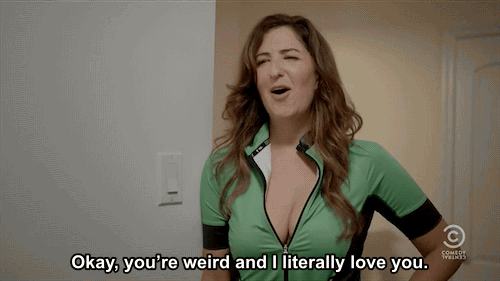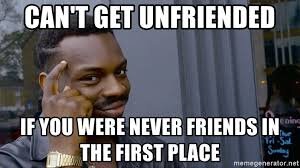Ok, so last week we discussed the differences between the judger and the perceiver and what that means for us. What it means for our friendships however, is that we will frustrate one another quite significantly.
As a judger type, I know I frustrate my perceiver friends. I ask them too far in advance to lock in plans, and they are either reluctant because they cannot think that far in advance, or they are willing but resentful and will be just as likely to cancel anyway because the time of my suggestion seemed so far into the distant future they just assumed it would work out. When it doesn’t, they don’t think it is a big deal to change their plans.
This, in turn frustrates me no end as a judger. Why would I go to such extremes to book things in with you so far in advance if your attendance was not important, or if the plans weren’t important? Some things need to be booked and paid for in advance, and I expect if you have agreed to attend, and I have purchased tickets for us that you will infact treat it as important enough to remember and show up.
So the question remains, when we are so fundamentally different, how can we be better friends for each other? I know I have blogged before about some of my friends offering feedback about my inflexibility and now this is really making sense to me in ways that it didn’t quite penetrate before. It doesn’t matter if we end up having lunch at the local pub instead of the café, if we are still having lunch, I should let it go and roll with it, without unnecessary comments about the plan. Haha
What my perceiver friends need to understand is that there is a reason it was important to me. If I suggested the café, there was a reason for it. Maybe it has a playground for my kids that the tavern doesn’t have, or maybe it does the vegan menu that someone accompanying us will love. Added to which, if we all agreed on the café, you better believe I looked at the menu, decided what I was going to order and probably brought only around that amount of money, because I live by a budget. If the tavern is more expensive, yes, I can put it on the card, but I still have to then sit down and rebalance everything to make that work.
All of this doesn’t mean I can’t be flexible, I can be and I should be, but it is easier on me if you acknowledge why this will be a concern and not just call me inflexible. In return I should acknowledge that when you are flaky it isn’t always your fault. If your family frequently makes last minute requests for your time and you are a people pleaser, I should acknowledge that I know it isn’t personal when you change plans, but that you have found yourself in a bad position letting everyone down somewhat in an effort to please everyone.
Remember this is true on both sides, and you are both probably frustrated.
Ultimately neither of us can or will change who we are or how we live, nor how the people impacting us live, but this understanding of the position of the other person goes a lot further than frustration in helping the situation. As I prefer absolutes, don’t agree to plans with me on your grandmother’s birthday even though you are fairly sure her party wont be on the actual day. Because murphy’s law says if you make plans with me she will celebrate that day, and of course, you will have to go. But I will be annoyed you didn’t think of that BEFORE you said yes. However, if the plan is we have to see the 9pm movie instead of the 7pm movie to accommodate this birthday, I should be cool with that and accept that it isn’t ideal, it will impact my morning walk, but that is my problem and isn’t more important than Grandma’s 90th birthday party.
When I take time to reflect why so many of my friends are perceivers, it is probably because we are more compatible than we think. Perceivers like that I take control, make the plans and they just show up and have a good time. I like that when life throws a spanner in the works and I have to adjust made plans; that they are totally flexible and just go along with whatever I decide needs to happen instead.
When 2 judgers get close, each one wants to be the one making the suggestions, and gets resentful at helpful hints to change things somewhat to suit the other judger. Each one wants to impress the other with his or her knowledge of cool places or suggestions and it can become a competition of sorts. And each one would rather be in control of meeting when it suits him or her and not at the call of the other. It can be harder to co-ordinate.
When 2 perceivers are friends, they can go a very long time without making contact at all. When they do make contact it is usually impromptu “I am in town, come to the local for a drink, I am there now?” If their friend is free, they are excited by the invitation. However they are just as likely not to show up and not call because they decided to do the washing first and then they got distracted doing something else. Plans are often forgotten, rescheduled perpetually or cancelled at the last minute.
So this means we’re more compatible with our opposite than our counterpart. But it doesn’t mean we can’t be better friends to our counterparts too. For perceivers this means deciding to stick to a plan after the 3rd reschedule. It means putting reminders in your phone to contact that friend at least once a month and it means holding each other accountable for flakiness and silly excuses.
For judgers it means taking turns at making the plans and trying to enjoy the plans your friend made for you. Don’t criticise, make suggestions or talk about the time you did the same thing and it was better because…. Just enjoy it. Compliment their choices, appreciate the effort they went to and attempt to enjoy relinquishing control and responsibility. Trust them to know you can’t eat seafood and not to book a fish dinner. And if they do book one, ask for a salad and don’t make a big deal about it. One light meal wont kill you but a sour attitude will kill the ambience.
Only drive when you are in the drivers seat with the keys to the car.
My best advice is this. If your friend is a judger, understand they would rather have no plans at all than plans that are unlikely to happen, and give as much notice as you can to any changes so they can process these and make allowances and be flexible for you. If your friend is a perceiver, treat plans with them as though they are penciled or tentative. Don’t pressure them to commit too far in advance and if you have to, always have a back up plan in mind.
It is ok for judgers to stand their ground and be inflexible when they need to be, and it is ok for perceivers to make changes when they need to. Sometimes these things happen. But judgers are at risk of saying it is easier not to have friends at all and perceivers are just as likely to end up with none because of their flakiness. So we really must try harder to understand each other and accommodate instead of asking each other to change totally.
One way is not better than the other, they can complement each other if we let them. So let’s all try to compliment our friends good points and what we can learn from them!
❤ Love,
Your Best Friend ForNever
xx
















































































































